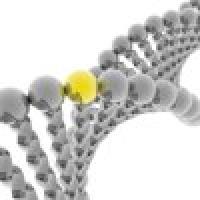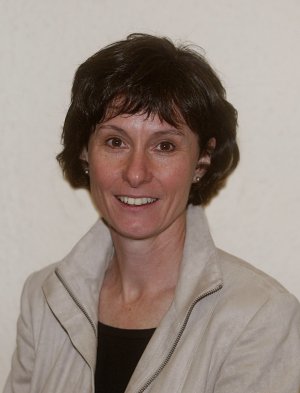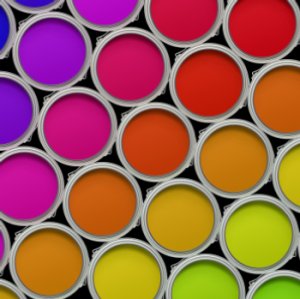
Evolutionary maths

Rosemary Varley
What is it that makes the human mind so unique and us humans so different from the other species we share this planet with? One thing that is universally present throughout human cultures, but absent in all other species, is language. Over the last few decades evolutionary psychologists have become increasingly interested in the role that language might have in enabling other functions in the human behavioural and cognitive repertoire. Some have argued that language is in fact a prerequisite for a whole range of other intellectual activities, including mathematics.
Is maths a parasite?
"Some people have suggested that the human mind possesses some kind of unique competence that is closely tied to language," says Rosemary Varley, Professor in Cognitive Neuroscience at the University of Sheffield and author of a number of studies on the connections between language and maths. "They claim that in cultures that contain maths, the mathematical structures are in a way parasitic on this language faculty: computational procedures and mathematical insights are developed by borrowing tools that are really there to understand and build language."
There is some evidence supporting this point of view. In 2004 the psychologist Peter Gordon carried out a study with members of an Amazonian tribe, who have explicit words only for the numbers 1 and 2 and refer to everything else as "many". It turned out that the tribe members were unable to perform simple mathematical tasks as soon as numbers greater than three were involved (see Plus article Speechless maths). While some researchers have read this as evidence for language as a prerequisite for thought, others simply turn the argument on its head. Rather than lacking maths for a want of words, it may be that tribe members lack number words because they have no need for maths. "It's clear that there is a connection between culture and language," says Varley, "but what is not yet clear is which way the relationship runs. Is it culture that determines language, or language that determines culture?"
Further evidence for a language/maths connection comes from neurology. Functional imaging studies of the brain show increased activation of the language areas as certain mathematical tasks are performed. "We also know that a considerable number of people with a language disorder called aphasia, also end up with acalculia, a condition that impairs mathematical ability," says Varley. "Brain systems show us that there is some kind of correlation between the capacity for language and the capacity for maths. Correlation, however, doesn't prove causation. It might just be — put simplistically — that the maths and language brain areas are very close together, or that an injury to the brain happened to hit both areas."
Maths without grammar
To explore whether maths really hinges on language, Varley and her colleagues have conducted studies with people whose capacity for grammar has been severely impaired by strokes or other types of brain damage. "We were focussing on grammar, rather than vocabulary, because vocabulary isn't unique to humans," she explains. "Dogs, for example, are able to comprehend a number of words from the human language, and certain species of monkeys have a vocabulary of calls to communicate with each other. It therefore seems to be grammar that makes human cognition special."
"In our first study [published in 2005 in the Proceedings of the National Academy of Sciences] we worked with three individuals with severe grammatical impairment, and checked to see whether their syntactic knowledge in maths was impaired in a parallel way. The results showed strong differences between the two systems: people were still sensitive to structures in mathematics that they could no longer understand in language."

Who's kissing who?
Varley and her colleagues asked their patients to consider reversible sentences like "The boy kissed the girl". "To understand the sentence, you have to work out that the boy is the active person and the girl is the one who receives the action," Varley explains. "There are similar structures in maths: the expression 7-2, for example, is completely different from the expression 2-7. In our study we found that patients who were unable to discriminate between sentences like 'the boy kissed the girl' and 'the girl kissed the boy' had no problem spotting the difference between 7-2 and 2-7, or 25/5 and 5/25."
In another experiment, the patients were tested on their ability to make sense of nested expressions. Although they were unable to understand embedded clauses like "the dog that is chasing the cat is black", they could still evaluate expressions like 36/(2 × 3), which depend on bracketing. "These, as well as the other tests we performed, gave clear evidence that language grammar is not what drives mathematical insight," says Varley. This evidence has been strengthened by recent studies replicating Varley's results.
Maths, language and abstraction
But maths isn't just about arithmetic. Advanced maths involves manipulating symbols rather than numbers; it's about abstraction. And so is language. In the 1940s a German neurologist called Kurt Goldstein was working with a woman who, when shown an object, was unable to name its colour. To see whether this was due to an inability to perceive colours, or to an inability to pin them down with words, Goldstein performed a number of tests using coloured chips. It turned out that his patient was perfectly able to match chips of a certain colour and hue to those of the same colour and hue: she could match dark blue chips to dark blue chips, light blue to light blue and so on. However, when asked to group together all the blues (light and dark), she failed.

How do we differentiate colours?
"This is the source of the notion that the language impairment aphasia is really something called asymbolia, a loss of the ability to process symbols," says Varley. "At a concrete perceptual level the lady was able to see two things as being the same, but when it came to an abstract term like blue, which encompasses a range of perceptually different things, she failed."
If aphasia really is a failure to understand symbols, then an individual with aphasia should also suffer severe impairment of algebraic ability. In a second study, published Neuropsychologia (see the end of this article for the precise reference) Varley and her colleague Nicolai Klessinger worked with a single individual who, before acquiring severe aphasia, had been an expert mathematician. "We found that despite his severe language impairment, he was still pretty competent in algebra. In many tests his performance matched that controls who had no brain damage and who were also highly mathematically competent. We also found that the patient was slightly better with algebraic expressions containing only abstract variables than with those containing only numbers. This is a very strong refutation of the notion of aphasia as a loss of an abstract symbolic faculty."
Relearning language with maths
Results like these clearly point to an independence of language and maths, at least later on in life. They may also have interesting therapeutic applications. In another case study Varley checked to see whether language ability could be regained on the back of mathematical insight. The study again involved an individual who retained maths, but had difficulty with language grammar. "We drew the individual's attention to something he understood very well in maths, for example that 7-2 is different from 2-7. We then linked the 7 and 2 to subject and object of sentences like 'the boy kissed the girl' pointing out that these are different as well.
"Similarly, people with agrammatic aphasia are believed to have particular difficulty with understanding verbs. Often they tend to neglect them, looking instead at those nice chunky nouns that have lots of meaning associated to them. But as soon as you start neglecting verbs, comprehension begins to fall apart, because you need the verb to understand the relationship between nouns." The mathematical analogue of a verb in a sentence is an operator like a plus or minus sign. Varley gave her patient missing operator problems: he was asked, for example, to complete the expression 10 ? 4 = 40 so that it is correct. "We highlighted the importance of the operator and then pointed out that operators are like verbs. 'The boy hit the girl' and 'the boy kissed the girl' are two completely different things. The verb is the glue of a sentence and you must attend to it."

Is there a maths gene?
To Varley's surprise, this bootstrapping process worked. The patient showed improved understanding of the sentences he had previously had difficulty with, and this was retained for up to four months after the therapy finished. "We were surprised, as this was one of our wilder notions. The analogy between language sentences and mathematical expressions is a big metaphor to grasp for any mind; for a damaged mind it's an inferential leap. It's a novel but potentially interesting intervention for aphasia, and one that could work with other language disorders also."
A natural question is whether Varley's work also has consequences for maths education. Anecdotal evidence suggests that students who are perfectly able to solve a maths problem when it's presented as straight maths on paper have difficulty solving it when it's presented using language. Just remember those dreaded "A farmer plants three hectares with potatoes and five with maize, how many cows does he have?" type exam questions. If maths is independent of language, then does adding language into early maths education just confuse the issue? "To answer these questions, we first need to know whether the disassociation of maths and language already exists in early life, or whether it only develops later on," says Varley. "There are indications of early disassociation, for example in the savant population: these are people with severe autism, who have advanced mathematical knowledge in the face of severe developmental language problems. But before we can draw consequences for children's education, we need more developmental work on early-life questions."
The maths gene
So what about the initial question: did our capacities for maths and language evolve separately, or is maths a by-product of language? Results like Varley's hint towards the former, but also show up the analogies between maths structures and language structures. "One possibility is that language and maths co-evolved from some common underlying ability," says Varley. "There might be something about our mind or brain that enables us to acquire complex symbolic structures and enables both maths and language. If we happen to live in a language culture, which all humans do, we acquire language, but if we happen to live in a culture which has maths, then by that same faculty we acquire maths."A lot more work needs to be done to test hypotheses like this one, but it's well worth doing. Understanding the evolution of our various faculties will provide an important clue to the riddle of human cognition. Our fascination with this riddle is nothing new. The ancient Greeks left us the fitting aphorism "Know thyself and thou shall know all the mysteries of the gods and the universe." Its origin is unclear, but it's nice to note that two of the people it has been attributed to, Pythagoras and Thales, were mathematicians.
About this article
Rosemary Varley is Professor of Cognitive Neuroscience at The University of Sheffield. Her research focuses on the communicative and cognitive impairments that result from brain injury in adults, and the rehabilitation of those impairments. Her research is funded by government research councils, charities, and commercial sector partners.
The reference for the Neuropsychologia paper is: Klessinger, N., Szczerbinski, M., & Varley, R. 2007. Algebra in a man with severe aphasia. Neuropsychologia, 45, 1642-1648.
Marianne Freiberger is co-editor of Plus